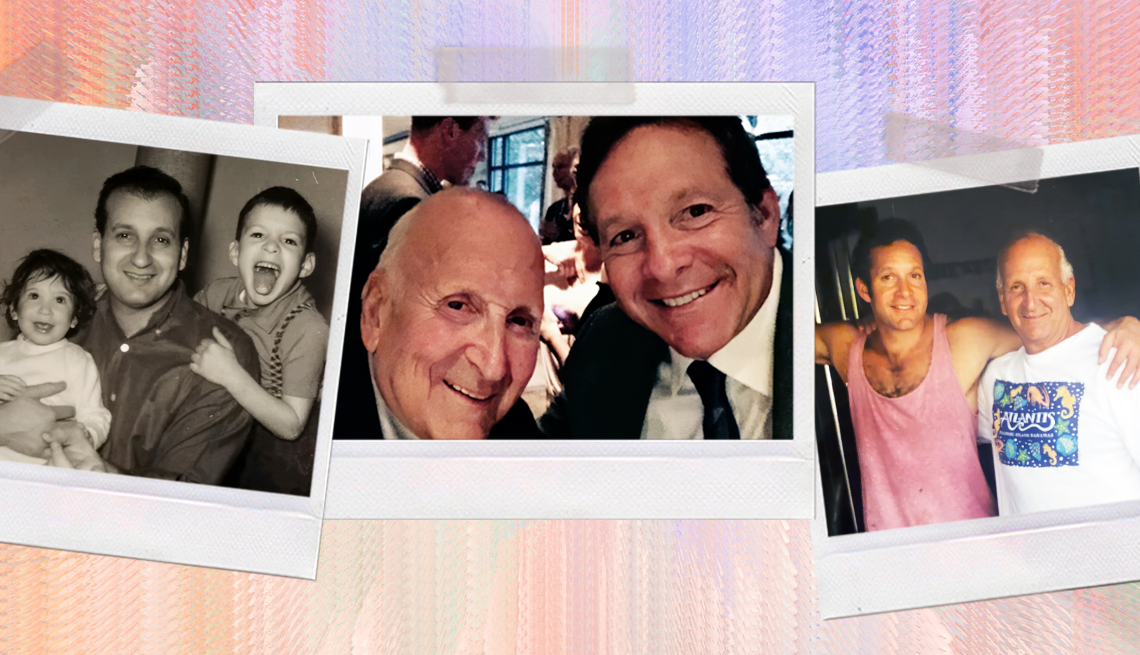AARP Hearing Center


When actor Steve Guttenberg’s father was diagnosed with kidney disease, the actor stepped into the most important role of his life: caregiver for “his idol.” The star of movies such as Cocoon, Police Academy and Three Men and a Baby began waking up at 3 a.m. for a weekly drive from Los Angeles to Phoenix for his father’s dialysis treatments. Stanley Guttenberg, an Army Ranger, NYPD officer and later engineer, received the diagnosis of kidney failure in 2017 at the age of 84. He was a role model for his son his entire life, and the respect between father and son was mutual. “My dad was my greatest teacher,” says the actor. “His love was bottomless and his strength through this amazed me. He used to say, ‘You can love someone, or you can love someone and show up.’ ” Steve did both.
Stanley Guttenberg was the first one to champion his son when Steve followed his dream in Hollywood, and he proudly attended every movie premiere. “My Dad loved my success,” writes Guttenberg, 65, in Time to Thank – Caregiving for My Hero, a memoir that toggles between growing up with his father and a poignant account of caring for him at the end of life.
Steve took his caregiving one step further, becoming a certified dialysis technician to personally administer his father’s treatment when he was home. “Caregivers need to be prepared to call on a great amount of patience, but making the decision to do this required no thought at all,” Steve says.
Increasing numbers of male caregivers
In the past, the “typical” caregiver has been a daughter or female spouse providing unpaid care for a relative, loved one or friend. The reality is that an increasing number of caregivers are men, who may approach their roles slightly differently than women. In 2009, men comprised 34 percent of family caregivers of adults. In 2020, according to a report by the National Alliance for Caregiving and AARP (“Caregiving in the U.S. 2020”), roughly 40 percent of informal caregivers in the U.S. were men. And that number is likely to increase, according to a 2019 NIH study, due to a shrinking family caregiver pool and shifting policies that provide better support for all caregivers, regardless of gender.
There are many similarities regarding how genders approach the caregiving experience, including the fact that men and women who are not full-time caregivers may not identify with this title.
“A lot of the right mindset around being a caregiver is the ability to identify as one,” says Kate Abate, Community Life Director at Broadview Senior Living in Purchase, New York, a residential retirement community for people with mixed care needs. “After baby boomers, millennial males are the second largest cohort of men doing the caregiving for parents and grandparents.”
The role also places a heavy burden on all caregivers, from high levels of physical and financial strain to disruptions in career or income. Men and women may also similarly feel that assuming caregiving duties is not a choice.
Tasks versus contributions
But there are also some key differences between the genders. A 2023 story in The Street revealed that approximately 78 percent of men have little or no support from other caregivers and are less likely to admit their negative feelings or process and share emotions related to their caregiver role. Men also tend to break down caregiver roles into tasks to be checked off a list and completed, which means they often don’t recognize their actions as caregiving contributions. According to a 2017 report by AARP, male caregivers report more discomfort with high-touch personal care, which encompasses acts such as changing adult briefs or bathing. Men who are responsible for their wife’s care might be more inclined to hire a caregiver, rather than provide it themselves, due to this discomfort.






























































More From AARP
Why It’s Critical to Have a Backup Family Caregiving Plan
If the primary caregiver dies or becomes incapacitated, who will take care of your loved one?How Caregivers Can Deal With Nosy Neighbors
Learn ways to brush off unsolicited input and adviceHow to Help a Family Caregiver From Afar
Ways to support loved ones and their local caregivers when you can’t be there in person